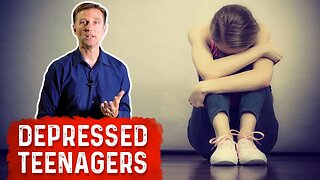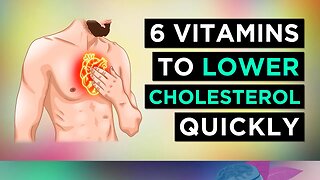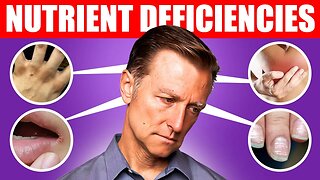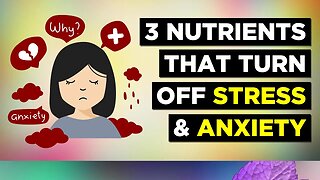Massive 2022 Study Showed that Vitamin D Reduces Depression
Another study showing how, this time, Vitamin D can help people who have been diagnosed with depression.
Renue by Science 10% Discount Code: MYNMN (https://renuebyscience.com/?rfsn=5692699.331801&coupon-code=MYNMN)
Renue by Science 15% Subscription Service Discount Code: MYNMNSUB
DoNotAge.org 10% Discount Code: MYNMN (https://bit.ly/2VBDgNt)
I hope you enjoy my content and find it interesting or informative, if so, please consider supporting the channel by using one of the links below:
*Buy me a Kofi: https://ko-fi.com/mynmnexperiment
*Patreon: https://bit.ly/3hhfjl5
*SubscribeStar: https://bit.ly/3psYo23
My Current Anti-Aging Protocol:
• 1.5 grams of NMN (https://bit.ly/3c2Fxt8)
• 1.5 grams of Trans-resveratrol (Tue, Thu & Sat) (https://bit.ly/3yxeqy2)
• 1.5 grams of Berberine (https://bit.ly/3O0v5zq)
• 1.5 grams of TMG (https://bit.ly/3oe1Ted)
• 5,000 IU (International Units) of vitamin D3 (https://bit.ly/3P32hYH)
• 120 mcg (micrograms) of vitamin K2 (Mk 7) (https://bit.ly/3PhkBgn)
• 250mg Magnesium (L-Threonate) (https://bit.ly/3O4pZ5o)
• 200mg high molecular weight hyaluronic acid (https://bit.ly/3P0Z4c2)
• 2,400mg of Fisetin, on the 1st, 2nd & 3rd of each month (https://bit.ly/3P2rSB0)
• 2,400mg of Quercetin, on the 1st, 2nd & 3rd of each month (https://bit.ly/3IzulAy)
• 81mg of aspirin (https://bit.ly/3uFjtem)
Our bodies need the right amount of vitamin D to function as normal – both physically and mentally, and there's a growing amount of evidence linking a lack of vitamin D with depression. Vitamin D3 can have an impact on as many as 2,000 different genes within the body, and has a direct role on far more aspects of health than many people might realize. With late life depression having a knock-on effect on the quality of life, how soon people go into residential care, and even the chance of an early death, boosting vitamin D levels could offer new opportunities for tackling these problems in older people. Vitamin D supplements aren't difficult to come by, they are relatively cheap and are considered safe to take, so much so that researchers are now calling for updated guidelines on recommended vitamin D intake – guidelines that could have a real impact on the older population.
This new study, a new meta-analysis of 41 previous studies suggests that taking vitamin D supplements can relieve depressive symptoms in people already diagnosed with depression, opening up a potential alternative option for treatment. As well as controlling levels of calcium and phosphate in the body, it's thought that vitamin D helps to regulate various functions in the central nervous system. Earlier research on animals suggests it could even contribute to the control of chemical balances in the brain, which may explain the association between vitamin D and mental health.
Vitamin D is not really a vitamin, vitamins are special nutrients that the body needs but cannot make, so they must be obtained from what we eat or through supplementation. Because our bodies can make Vitamin D in our skin when it is exposed to sunlight, Vitamin D is considered a hormone.
Vitamin D is available in two forms: vitamin D2 and vitamin D3; the main difference really is just the source.
• Vitamin D3 is created from animal products and is the closest to that which is naturally made by the body through sunlight exposure. Because of this familiarity most doctors and nutritionists recommending supplementing with vitamin D3.
• Vitamin D2 is manufactured from plants and fungi (and often the type that’s included in fortified milk, bread, and cereals), this version is favored by vegans etc.
Tuomas Mikola, doctoral researcher and lead author of the study, working out of the University of Eastern Finland said "These findings will encourage new, high-level clinical trials in patients with depression in order to shed more light on the possible role of Vitamin D supplementation in the treatment of depression."
The new meta-analysis covered a total of 53,235 study participants from 41 studies, including those with and without depression, people taking vitamin D supplements and people taking placebos, and individuals with a variety of physical conditions. While the doses used varied, the typical vitamin D supplement was 50-100 micrograms a day (that is 2,000 to 4,000 International Units).
DISCLAIMER: This video and description contain discount codes, which means that if you use the code, I will receive a small commission.
FAIR-USE COPYRIGHT DISCLAIMER
Copyright Disclaimer Under Section 107 of the Copyright Act 1976, allowance is made for "fair use" for purposes such as criticism, commenting, news reporting, teaching, scholarship, and research. Fair use is a use permitted by copyright statute that might otherwise be infringing. Non-profit, educational, or personal use tips the balance in favor of fair use. #VitaminD #VitaminK2 #VitaminD3
-
 6:04
6:04
Natural Cures
3 years ago $0.03 earnedThe Lack of These Vitamins May Be Causing Your Depression
3241 -
 29:49
29:49
Schizophrenia Help
1 year ago26 Ways to FIGHT Depression NATURALLY
714 -
 3:35
3:35
Dr. Eric Berg
3 years agoLow Vitamin D Linked to Depressed Teens
18 -
 2:52
2:52
Natural Cures
4 years agoVitamin A Benefits That Will Dramatically Improve Your Health
13 -
 3:11
3:11
SAC Best Supplements
3 months agoMultivitamins Exposed! 🚨 The Truth Behind Their Benefits
261 -
 12:09
12:09
Ryan Taylor Natural Remedies
1 year ago $0.05 earned6 Vitamins That LOWER Your LDL CHOLESTEROL
122 -
 9:00
9:00
Dr. Eric Berg
1 year agoThe 5 Nutrient Deficiencies Behind Depression
158 -
 8:32
8:32
Just In Health
3 years agoNutrients to Help Make Serotonin to Help Improve Mood and Sleep
68 -
 4:35
4:35
Ryan Taylor Natural Remedies
2 years ago $0.10 earnedThe BEST 3 Nutrients To Relieve Anxiety
86 -
 0:58
0:58
Dr. Tom Biernacki
1 year ago $0.03 earnedWhy You Need Vitamin D3!
332